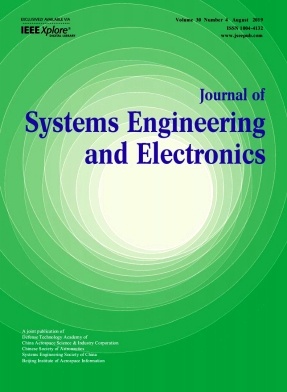
Journal of Systems Engineering and Electronics
SCI核心期刊- 主管单位:中国航天科工集团
- 主办单位:中国航天科工防御技术研究院;中国宇航学会;中国系统工程学会
- 类别:公司类
- 审稿时间:1-3个月
- 国内刊号:11-3018/N
- 国际刊号:1004-4132
- 创刊:1990
- 周期:双月刊
- 语言:中文
- 曾用名:
- 邮发:82-270
- 出版地:北京
- 邮编:100854
- 快捷分类:科学
- 主编:施荣
- 影响因子:0.58
- 级别:SCI核心期刊

《Journal of Systems Engineering and Electronics》是《中国科学引文数据库》来源期刊,被美国科学引文索引(SCIE)、美国工程索引(EI)和英国科学文摘(SA)等多家国内、外著名检索系统收录。
《Journal of Systems Engineering and Electronics》是面向高科技开发和应用的跨学科期刊,以传播新技术、促进学术交流为宗旨,坚持深度与广度、理论与应用相结合的方针,努力反映系统工程与电子技术两大领域的最新成就,报道的主要内容包括:系统科学、军事系统分析、飞行器控制、雷达、光电探测技术、信息获取与处理、运筹学管理与决策技术等。
ISTP期刊、文摘与引文数据库、维普收录(中)、剑桥科学文摘、SCI 科学引文索引(美)、上海图书馆馆藏、国家图书馆馆藏、万方收录(中)、国际中英文、EI 工程索引(美)、知网收录(中)
中国核心期刊遴选数据库、中国期刊全文数据库(CJFD)
系统工程、电子技术、军用系统分析、防御电子技术、控制理论与实践、软件、算法与仿真、计算机开发与应用
1-3个月
Aims and scope
The journal, keeping abreast with the development trend of science and technology worldwide, reports the latest developments and achievements in systems engineering and electronics and related research areas, and encourages various academic views. The journal welcomes papers from a wide variety of countries.
The journal strives to publish high-quality papers reporting original work in both theoretical and practical research results within the journal scope, involving system analysis, system modeling and simulation, military system analysis, aircraft control, C3I, radar, information systems engineering, machine intelligence, artificial neural networks, information acquisition and processing, aerospace electronics, and other topics in all related fields.
Title
The title is centered on the page and should be short and concise. Please limit the title to a maximum length of 10 words. The author’s name follows and is also centered on the page. The author’s last name should be preceded by the other names spelled out in full. The author’s affiliation and address are also needed.
The corresponding author should be clearly indicated with the asterisk (i.e., *) and given on the bottom of the first page. Please provide the financial support acknowledgments (name and number) on the bottom of the first page.
Abstract
An abstract, not exceeding 200 words, is required for all papers. Acronyms and abbreviations are spelled out at first mention in the abstract. It should be a summary of the paper and not an introduction. Because the abstract may be used in abstracting journals, it should present concisely the purposes, methodology used, results obtained, and conclusions.
Keywords
The author must provide a list of keywords, up to a maximum of six. No acronyms and abbreviations should be used.
Text
Text should be typed in double-column. The introduction of paper should explain the nature of the problem, previous work, purpose, and contribution of the paper. It is assigned the number “1” and following sections are assigned number as needed. For example, the third section of a paper might be “3. Simulation results” headings. Acronyms and abbreviations are spelled out at first mention in the text, even they have already been defined in the abstract.
Figures and tables
The authors must ensure figures of sufficient quality and resolution. Figure captions appear below the figures. Figures should be numbered in the order they appear in the text. Table titles appear above the tables. Please verify that the figures and tables you mention in the text actually exist. When referring to a figure or a table in the text, use the abbreviation “Fig.” even at the beginning of a sentence, and do not abbreviate “Table”.
Equations
Number equations consecutively with equation numbers in parentheses flush with the right margin, as in (1). Be sure that the symbols in the equation have been defined before the equation appears or immediately following. When referring to “(1)”, do not use “Eq. (1)” or “equation (1),” except at the beginning of a sentence: “Equation (1) is ...”.
Conclusion
A conclusion must be included and should indicate clearly the advantages, limitations, and possible applications of the paper.
Acknowledgment
Individuals or units other than authors who were of direct help in the work should be acknowledged by a brief statement following the conclusion. This heading is not assigned a number.
References
Only articles that have been published may be included in the references. Each reference is referred to in the text by a number enclosed in a square bracket (i.e., [3]). References must be numbered and ordered according to where they are first mentioned in the paper. A reference list must be included using the following information as a guide.
Biographies
Short biographies (120-150 words) should be provided that detail the authors’ education, work histories and research interests as well as their E-mail. The authors’ full names are needed. Small (2.5 cm×3.5 cm), black-and-white and high- resolution (300 dpi) photos of each author should be included.
与国外研究员合作,共享学术资源,确定研究计划,帮作者节省大量时间和精力,并且及时告知投稿进程,更有保障。
全程协助发表是针对学术论文,从评估到期刊接收,全过程进行专业协助的个性化订制服务,通过我们......
期刊推荐专家均来自医学、生物、化学、材料、物理、机械、人文等1200+领域知名期刊的评审团队......
预审评估、投刊前评审、专业学术评审等服务,可获得同领域专家的评审意见和建议,在投稿之前得到进一步改进,从而提高被接收的几率。
为您提的英文母语翻译服务可以帮助非英语为母语国家的科研学者节省大量的时间和精力,确保论文不会因为语言、语法等问题而拒稿。
论文翻译有国内外高校和科研机构精通中英双语的专家,更有对应学科领域的母语专家翻译,达到国际期刊的录用要求提升接收概率。
使用国际期刊通用数据库进行英文审核,可以检查自己的文章重复度,获得与出版商相同的数据和重复率信息,从而保护自己的学术声誉。
旨在帮助作者将稿件提交至目标期刊投稿系统,从而让作者避免因对某个投稿系统不熟悉而耽误宝贵时间,甚至因误操作而导致退稿或拒稿。
不成功退款,无后顾之忧,风险服务升级。
资质许可齐全,合规经营,用户权益有保障。
刊物在国家新闻出版署网可查,抵制假刊、增刊。
交易均通过对公账户,资金安全有保障。
812751拥有老客户
918539评职称指导
63352国际出版服务
819867开具合同